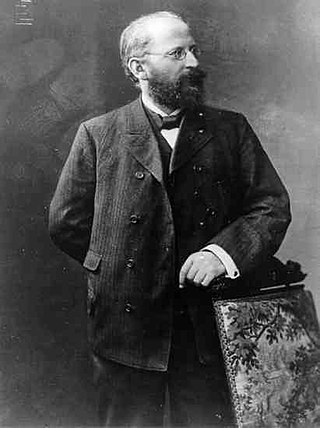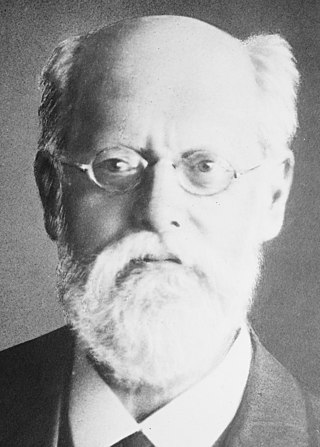
Eduard Bernstein was a German social democratic Marxist theorist and politician. A member of the Social Democratic Party of Germany (SPD), Bernstein had held close association to Karl Marx and Friedrich Engels, but he began to identify what he believed to be errors in Marxist thinking and began to criticize views held by Marxism when he investigated and challenged the Marxist materialist theory of history. He rejected significant parts of Marxist theory that were based upon Hegelian metaphysics and rejected the Hegelian perspective of an immanent economic necessity to socialism.
Social Reform or Revolution? is an 1899 pamphlet by Polish-German Marxist theorist Rosa Luxemburg. Luxemburg argues that trade unions, reformist political parties and the expansion of social democracy—while important to the proletariat's development of class consciousness—cannot create a socialist society as Eduard Bernstein, among others, argued. Instead, she argues from a historical materialist perspective that capitalism is economically unsustainable and will eventually collapse and that a revolution is necessary to transform capitalism into socialism. The pamphlet was heavily influential in revolutionary socialist circles and along with Luxemburg's other work an important precursor to left communist theory.
Marxism is a method of socioeconomic analysis that uses a materialist interpretation of historical development, better known as historical materialism, to understand class relations and social conflict and a dialectical perspective to view social transformation. It originates from the works of 19th-century German philosophers Karl Marx and Friedrich Engels. As Marxism has developed over time into various branches and schools of thought, no single, definitive Marxist theory exists. Marxism has had a profound impact in shaping the modern world, with various left-wing and far-left political movements taking inspiration from it in varying local contexts.
Legal Marxism was a Russian Marxist movement based on a particular interpretation of Marxist theory whose proponents were active in socialist circles between 1894 and 1901. The movement's primary theoreticians were Pyotr Struve, Nikolai Berdyaev, Sergei Bulgakov, Mikhail Tugan-Baranovsky and Semyon Frank. The name was derived from the fact that its supporters promoted their ideas in legal publications.
Criticism of Marxism has come from various political ideologies and academic disciplines. This includes general intellectual criticism about dogmatism, a lack of internal consistency, criticism related to materialism, arguments that Marxism is a type of historical determinism or that it necessitates a suppression of individual rights, issues with the implementation of communism and economic issues such as the distortion or absence of price signals and reduced incentives. In addition, empirical and epistemological problems are frequently identified.

Richard David Wolff is an American Marxian economist known for his work on economic methodology and class analysis. He is a professor emeritus of economics at the University of Massachusetts Amherst and a visiting professor in the graduate program in international affairs of the New School. Wolff has also taught economics at Yale University, City University of New York, University of Utah, University of Paris I (Sorbonne), and The Brecht Forum in New York City.
Social democracy is a political, social, and economic philosophy within socialism that supports political and economic democracy. As a policy regime, it is described by academics as advocating economic and social interventions to promote social justice within the framework of a liberal-democratic polity and a capitalist-oriented mixed economy.
Andrew Arato is a professor of Political and Social Theory in the Department of Sociology at The New School, best known for his influential book Civil Society and Political Theory, coauthored with Jean L. Cohen. He is also known for his work on critical theory and constitutions and was from 1994 to 2014 co-editor of the journal Constellations with Nancy Fraser and Nadia Urbinati.
Marxism is a method of socioeconomic analysis that originates in the works of 19th century German philosophers Karl Marx and Friedrich Engels. Marxism analyzes and critiques the development of class society and especially of capitalism as well as the role of class struggles in systemic, economic, social and political change. It frames capitalism through a paradigm of exploitation and analyzes class relations and social conflict using a materialist interpretation of historical development – materialist in the sense that the politics and ideas of an epoch are determined by the way in which material production is carried on.
Democratic socialism is a left-wing political philosophy that supports political democracy and some form of a socially owned economy, with a particular emphasis on economic democracy, workplace democracy, and workers' self-management within a market socialist economy or an alternative form of a decentralised planned socialist economy. Democratic socialists argue that capitalism is inherently incompatible with the values of freedom, equality, and solidarity and that these ideals can only be achieved through the realisation of a socialist society. Although most democratic socialists seek a gradual transition to socialism, democratic socialism can support revolutionary or reformist politics to establish socialism. Democratic socialism was popularised by socialists who opposed the backsliding towards a one-party state in the Soviet Union and other nations during the 20th century.
Revisionism represents various ideas, principles, and theories that are based on a revision of Marxism. According to their critics, this involves a significant revision of fundamental Marxist theories and premises, and usually involves making an alliance with the bourgeois class. Some academic economists have used revisionism to describe post-Stalin, Eastern European writers who criticized one-party rule and argued in favour of freedom of the press and of the arts, intra- and sometimes inter-party democracy, independent labor unions, the abolition of bureaucratic privileges, and the subordination of police to the judiciary.
Neo-Marxism is a Marxist school of thought originating from 20th-century approaches to amend or extend Marxism and Marxist theory, typically by incorporating elements from other intellectual traditions such as critical theory, psychoanalysis, or existentialism. Neo-Marxism comes under the broader framework of the New Left. In a sociological sense, neo-Marxism adds Max Weber's broader understanding of social inequality, such as status and power, to Marxist philosophy.
Revolutionary socialism is a political philosophy, doctrine, and tradition within socialism that stresses the idea that a social revolution is necessary to bring about structural changes in society. More specifically, it is the view that revolution is a necessary precondition for transitioning from a capitalist to a socialist mode of production. Revolution is not necessarily defined as a violent insurrection; it is defined as a seizure of political power by mass movements of the working class so that the state is directly controlled or abolished by the working class as opposed to the capitalist class and its interests.
Marxian economics, or the Marxian school of economics, is a heterodox school of political economic thought. Its foundations can be traced back to Karl Marx's critique of political economy. However, unlike critics of political economy, Marxian economists tend to accept the concept of the economy prima facie. Marxian economics comprises several different theories and includes multiple schools of thought, which are sometimes opposed to each other; in many cases Marxian analysis is used to complement, or to supplement, other economic approaches. Because one does not necessarily have to be politically Marxist to be economically Marxian, the two adjectives coexist in usage, rather than being synonymous: They share a semantic field, while also allowing both connotative and denotative differences.
Orthodox Marxism is the body of Marxist thought which emerged after the death of Karl Marx and Friedrich Engels in the late 19th century, expressed in its primary form by Karl Kautsky. Kautsky's views of Marxism dominated the European Marxist movement for two decades, and orthodox Marxism was the official philosophy of the majority of the socialist movement as represented in the Second International until the First World War in 1914, whose outbreak caused Kautsky's influence to wane and brought to prominence the orthodoxy of Vladimir Lenin. Orthodox Marxism aimed to simplify, codify and systematize Marxist method and theory by clarifying perceived ambiguities and contradictions in classical Marxism.
Ethical socialism is a political philosophy that appeals to socialism on ethical and moral grounds as opposed to consumeristic, economic, and egoistic grounds. It emphasizes the need for a morally conscious economy based upon the principles of altruism, cooperation, and social justice while opposing possessive individualism.
Reformism is a political doctrine advocating the reform of an existing system or institution instead of its abolition and replacement via revolution.

Karl Johann Kautsky was a Czech-Austrian philosopher, journalist, and Marxist theorist. A leading theorist of the Social Democratic Party of Germany (SPD) and the Second International, Kautsky advocated orthodox Marxism, which emphasized the scientific, materialist, and determinist character of Karl Marx's work. This interpretation dominated European Marxism for two decades, from the death of Friedrich Engels in 1895 to the outbreak of World War I in 1914.

The following outline is provided as an overview of and topical guide to Marxism:
Social democracy originated as an ideology within the labour whose goals have been a social revolution to move away from purely laissez-faire capitalism to a social capitalism model sometimes called a social market economy. In a nonviolent revolution as in the case of evolutionary socialism, or the establishment and support of a welfare state. Its origins lie in the 1860s as a revolutionary socialism associated with orthodox Marxism. Starting in the 1890s, there was a dispute between committed revolutionary social democrats such as Rosa Luxemburg and reformist social democrats. The latter sided with Marxist revisionists such as Eduard Bernstein, who supported a more gradual approach grounded in liberal democracy and cross-class cooperation. Karl Kautsky represented a centrist position. By the 1920s, social democracy became the dominant political tendency, along with communism, within the international socialist movement, representing a form of democratic socialism with the aim of achieving socialism peacefully. By the 1910s, social democracy had spread worldwide and transitioned towards advocating an evolutionary change from capitalism to socialism using established political processes such as the parliament. In the late 1910s, socialist parties committed to revolutionary socialism renamed themselves as communist parties, causing a split in the socialist movement between these supporting the October Revolution and those opposing it. Social democrats who were opposed to the Bolsheviks later renamed themselves as democratic socialists in order to highlight their differences from communists and later in the 1920s from Marxist–Leninists, disagreeing with the latter on topics such as their opposition to liberal democracy whilst sharing common ideological roots.



